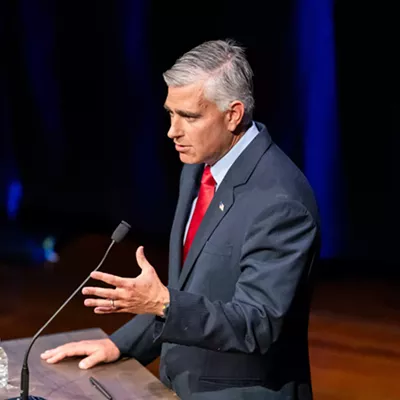If ever there were a lose-lose choice for Prosecutor Steve Tucker, it is deciding the fate of Brian Hirzel, the deputy who shot and killed an elderly Spokane Valley pastor in August.
If Tucker charges Hirzel with a crime, he risks losing the support of cops and law-and-order types right before the election. If he rules Hirzel did nothing wrong in shooting 74-year-old Wayne Scott Creach, Tucker may add to suspicions that he’s too cozy with police and won’t hold them accountable.
The case has loomed large in the prosecutor’s race — giving a foothold to Democratic challenger Frank Malone — while Tucker, who’s led the office for the past 12 years, has vowed to act swiftly.
“I don’t want to sit on it through the election,” Tucker told The Inlander on Sept. 14.
That stance has changed. Last Friday, Tucker said he never “vowed” to make a decision before the election — as the Spokesman reported — and said at this point he’s unlikely to rule on the case in the next two weeks.
“I called the Creach family this morning and said I wasn’t going to spoil a full review of the case just to get it done before the election,” Tucker, 59, said on Friday.
Malone, 67, has called on Tucker to ask an outside prosecutor to determine whether to charge Hirzel. If elected, Malone says he would always request outside investigators and prosecutors to investigate cases involving the conduct of local law enforcement.
“It’s a confidence issue,” Malone says. The Spokane Police Department and the Sheriff’s Office are too close to investigate each other, he says, and because Tucker’s office also represents the county in civil lawsuits, it can’t fairly judge cases in which the county may be liable.
“It’s not about passing the buck” on tough decisions, Malone says. “It’s about getting someone who’s out of these cozy relationships to investigate.”
Malone says he’s hopeful about his chances of unseating Tucker, who ran unopposed in 2002 and defeated local attorney Bob Caruso in 2006. He points to the August primary, in which he and three other candidates challenged Tucker and got a total of 74 percent of the vote.
“That’s a 74 percent disapproval rating,” Malone says, adding that the Hirzel case — plus two other recent officer-involved shootings — have put a spotlight on Tucker’s office, which Malone believes works in his favor. “I think I have a good chance.”
Malone, who served in the Air Force and Air National Guard for 26 years, earned a master’s degree in business administration from Eastern Washington University before graduating from Gonzaga Law in 1985. He says he’ll bring a thoughtful and engaged management style to the office — something he says has been missing under Tucker.
Being new to the prosecutor’s office, Malone says he isn’t wedded to the status quo. He’s open to shaking things up: “I will be listening to people in the office. I can look at things with an open mind.”
Tucker was a state trooper for 11 years, then graduated from Gonzaga Law in 1984 and went on to become a deputy prosecutor. Now, as chief of the prosecutor’s office, he makes about $145,000 a year.
In the primary run-up, Tucker fended off challenges from two former employees, Chris Bugbee and Dave Stevens, both of whom echoed the criticism of Tucker as an absentee administrator.
On Friday, however, Tucker touted his experience leading the office, as well as his time as a law enforcement officer, as strong reasons to vote for him.
“We have the highest trial conviction rate in the state of Washington among the larger counties. We’re at 90 percent,” he says. “I feel like I’m the most qualified for this job because of my experience.”























